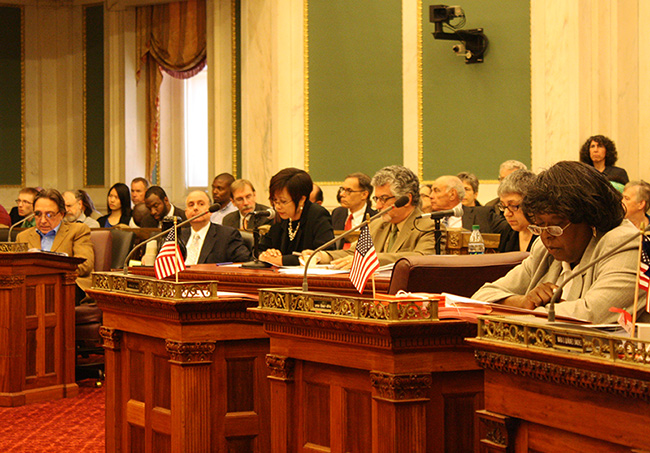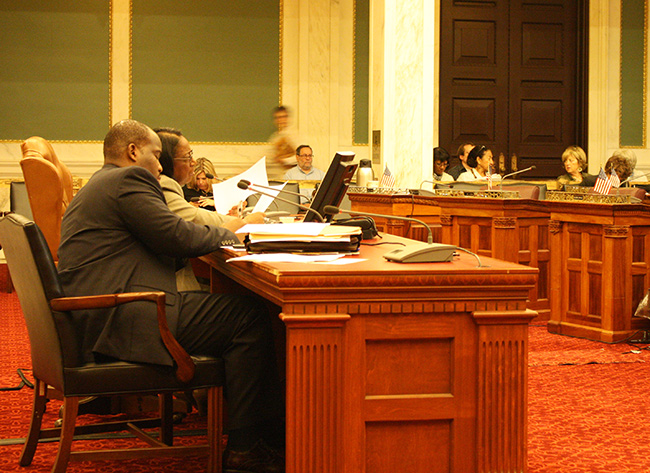City Council opens hearings on zoning code proposals, adjourns Committee until fall
The Committee of the Whole Council held its first hearings on the zoning code proposals of the Zoning Code Commission this morning, taking about 2 1/2 hours of testimony from ZCC members and other concerned stakeholders. Presiding over the meeting was 9th District Councilwoman Marian Tasco, who began the meeting by noting that there was a quorum, though by the meeting’s end, only a handful of councilmembers remained.
The first panel to testify consisted of four Zoning Code Commissioners. Alan Greenberger, ZCC Chairman and Deputy Mayor for Economic Development, recognized ZCC members in attendance and gave some background on the zoning code reform. Greenberger pointed out that the ZCC was created by ballot initiative because the current zoning code is broken, and Philadelphians have no expectation that it will function.
He presented as evidence the fact that Philadelphia’s Zoning Board of Adjustment hears 1,700 cases per year, far more than cities with much greater populations, such as Chicago and New York. He gave a brief overview of the commission’s work and recommendations, and added that the ZCC hoped Council would adopt its proposals before the end of the year. Greenberger then turned the floor over to ZCC director Eva Gladstein to give an overview of the “substantive changes” to the zoning code.
Introducing her testimony, Gladstein referred to the charter that created the commission, and which reads, “The Commission’s work shall be guided by the principles that Philadelphia’s Zoning Code should be consistent and easy to understand, should help shape future construction and development, and should enhance and improve Philadelphia’s development approval process while encouraging positive development and protecting the character of Philadelphia’s neighborhoods.”
Gladstein pointed out a number of highlights of the ZCC’s work in service of those principles. Among them were:
– Improved clarity and readability, through reorganization of the code and the use of maps, tables, charts and illustrations
– New, more informative names for zoning districts. For example, some residential districts will now be identified as RSA and RSD for Residential Single-Family Attached and Residential Single-Family Detached
– Consolidation of the 58 current zoning districts into 34 new zoning districts – Consolidation of the 48 current overlays into 13 new overlays
– Classification of more development and uses as by-right
– Implementation of Civic Design Review
– Improved notice of ZBA meetings and mandatory communications between developers and community groups
– Creation of three new mixed-use districts
“We view today’s testimony as one of many such conversations which will take place over the coming months,” Gladstein said.
Councilwoman Tasco then recognized Peter Kelsen, an attorney at Blank Rome and ZCC member appointed by councilwoman Joan Krajewski. Kelsen served as chair of the ZCC’s Work Plan Committee, and he described the work that the ZCC has done over the past 3 1/2 years. He told council that the ZCC had reviewed the zoning reform processes of other major cities, and solicited input from the public in a variety of ways. “In the end,” Kelsen said, “the entire Zoning Code Commission has had to take a stand on thousands of issues, big and small.”
Stella Tsai, an appointee of Mayor Michael Nutter who led the ZCC’s civic engagement committee, then testified about the ZCC’s efforts to engage the public. She described the importance of the diversity of the ZCC members and the commission’s communication with the public, which included surveying more than 2,000 individuals on components of the zoning code reform. “We have literally crisscrossed the city dozens of times to solicit input,” Tsai said, adding that public feedback was the cornerstone of the ZCC’s work.
The floor was then given over to a new panel, which consisted of Zoning Code Commissioners Emmanuel Kelly, an architect; Bill Salas, president of the Hispanic Association of Contractors and Enterprises; and Anne Papageorge, vice president of facilities and real estate services at the University of Pennsylvania. Kelly discussed how the ZCC proposals address issues of form and design.
Salas discussed how the principles of the Common Ground for Building Our City report informed the ZCC’s work. Anna Papageorge briefly described “the ways in which these zoning code proposals will help Philadelphia reach its goal of being the greenest city in the nation.”
After a few questions from Tasco, the next panel took the floor. That panel consisted of former candidate for City Council Andy Toy, Philadelphia Association of Community Development Corporations (PACDC) representative James White, Local Initiatives Support Corporation director Andrew Frishkoff, Right-Sized Homes, LLC president David Feldman, and Susan Klein of the Philadelphia Corporation for Aging. Each panelist urged council to adopt the ZCC proposals.
The most pointed recommendation came from Feldman, who encouraged councilmembers to look past any imperfections in the code. “Some claim that the proposed zoning code is still ‘flawed’, and not yet ready for passage,” Feldman read from his prepared testimony. “With regard to the zoning code, the definition of a ‘flaw’ is where someone didn’t get their way to give them a specific advantage … I implore Council not to use the red herring of ‘flaws’ in the zoning code to keep the current, deeply problematic, outdated zoning code on the books beyond this year.”
The next panel to testify consisted of three members. First to speak was Richard DeMarco, a zoning and land use attorney at Klehr Harrison Harvey Branzburg LLP. DeMarco noted that the zoning code proposals represented a series of “tremendous trade-offs” between various stakeholders, and asked council to take the final step of signing the bill into law. “The current zoning code is obsolete and broken,” DeMarco said. “The legislation that is before you will result in less uncertainty.”
Kiki Bolender, co-creator of Common Ground for Building Our City and a teacher at the Citizens Planning Institute, then gave two brief testimonies, first her own and then another on behalf of Julie Hoffman, president of AIA Philadelphia. The third speaker was Brian McHale, a member of the Common Ground group and self-described “zoning junkie.” McHale reminded Council that they could still amend the zoning code after it was enacted, so to delay its passage unnecessarily would be unhelpful.
The first to testify on the next panel was Rasheedah Phillips of Community Legal Services. Phillips spoke in favor of the new code, saying that zoning was “the entry point for all childcare providers.” The panel also include three members of the Crosstown Coalition: Steve Huntington, Sam Little, and Meg Greenfield. Greenfield, a member of the East Falls Civic Association and CPI graduate, expressed concern that the new code does not do enough to protect neighborhoods. Referring to controls dropped from the current code, Greenfield said, “This [proposal] does not give enough attention to the character of our neighborhood.”
Madeline Shikomba then spoke briefly, saying that it was hard to keep track of the ZCC’s constant changes to their proposals. She asked that the position of Public Advocate be established to help citizens keep track of the zoning code proposals.
The next panel consisted of four Germantown residents–Yvonne Haskins, Paula Paul, Connie Winters, and Robyn Tevah–worried about the removal of the Germantown special district overlay. That overlay currently prevents the opening of certain types of businesses such as beauty shops, dollar stores, and nail salons in Germantown’s commercial corridor. The overlay is gone from the reformed code. Robyn Tevah, a member of Germantown Community Connection, said that the new zoning code should protect Germantown’s historic character as well as promote economic revitalization. She was worried particularly about a proposed “low-end, suburban-style strip mall next to the train station, which should be the gateway to downtown Germantown.”
After brief testimony from attorney Cheryl Gaston, who was concerned about the brief amount of time the ZCC had allowed for feedback, the meeting was concluded. “This committee will stand adjourned until the fall of this year,” declared councilwoman Tasco. Council will again take up the issue–and open it to public comment–after summer recess.
Contact the reporter at jaredbrey@gmail.com
WHYY is your source for fact-based, in-depth journalism and information. As a nonprofit organization, we rely on financial support from readers like you. Please give today.





